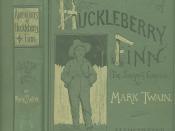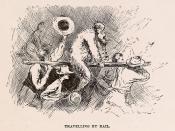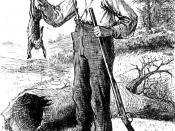Megan S. Harris
February 30, 2014
English 523
Colquitt
Racial and Familial Identity
The future of an individual in the Southern United States during the nineteenth century was determined by two main aspects of life: race and family. Whether someone was born white or black determined their social standing regardless of intelligence or work ethic. In addition to this, if born white, the family someone was born into made quite a difference in regards to social standing. Many more opportunities were presented to those born into prominent white families in the South. These aspects of Southern culture are apparent throughout Mark Twain's novels. The concept of developing one's identity would have been immensely complicated by these social constraints. This is apparent in the character of Huck Finn in Adventures of Huckleberry Finn as well as the character that comes to be known as Tom in Pudd'nhead Wilson. Although each of these novels are extremely different in regards to plot and character development, the protagonists do share several similar character traits.
Through the examination of both of these characters it becomes clear that the love for the individuals who become their family over powers race in construction of the characters' individual identities.
There seem to be two overlapping conflicts in the plot of Pudd'nhead Wilson. First, there is the fact that the slave woman known as Roxy has switched her mulatto baby with that of her master. Second, a murder appears later in the text which leads to the conclusion and illumination of Roxy's baby swap to the rest of the town. The swap in itself shows the importance of family to Roxy and brings about the idea that she is willing to disregard race for her child's well being. Upon switching the children Roxy exclaims: "Dah- now you...


